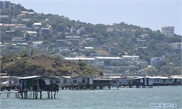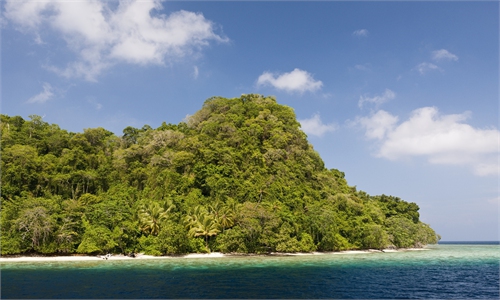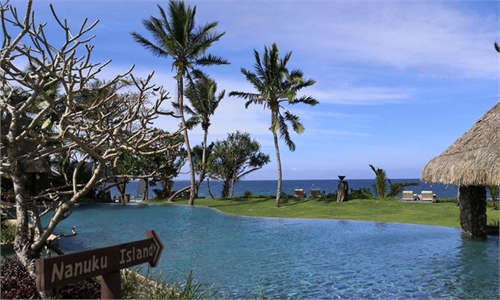Strengthening China-PNG ties won't be affected by external disruptions: Chinese envoy
BRI projects 'widely welcomed'; external meddling rejected
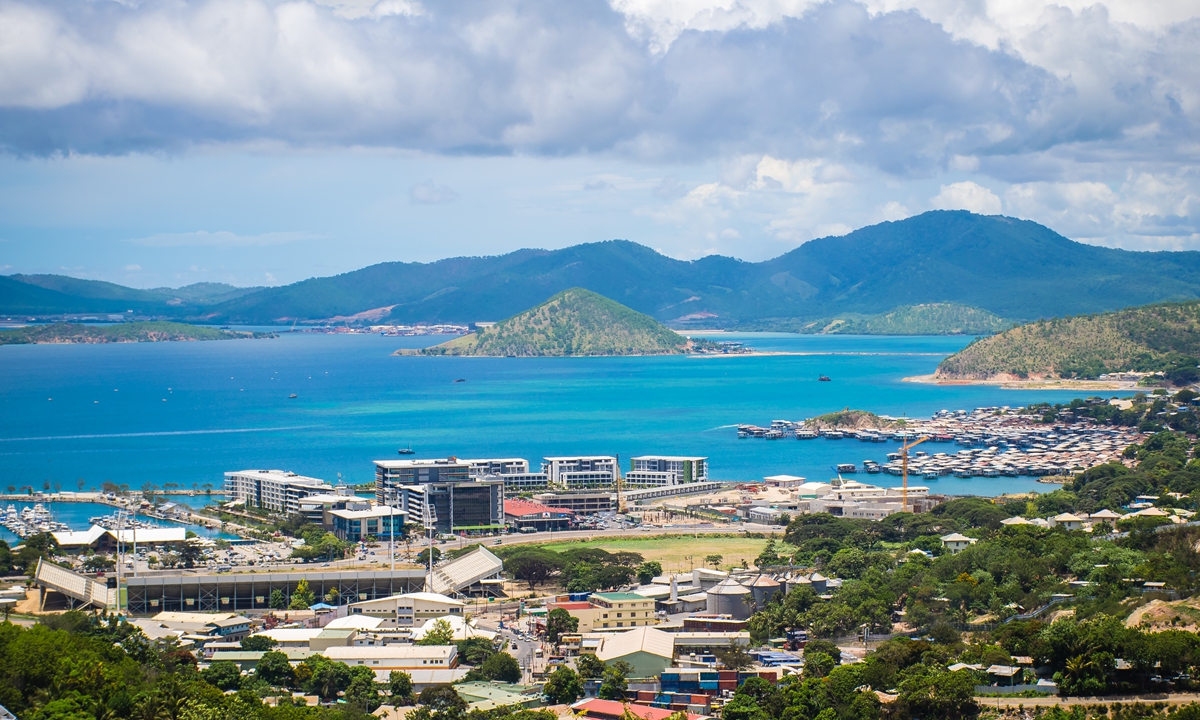
View of Port Moresby, the capital city of Papua New Guinea File photo: VCG
Editor's note:
In recent years, cooperation between China and Papua New Guinea (PNG) has seen rapid progress, especially after the South Pacific island nation became the first in the region to sign a MOU on the construction of the Belt and Road Initiative (BRI) with China. As Chinese State Councilor and Foreign Minister Wang Yi is visiting regional countries, including PNG, China's Ambassador to PNG Zeng Fanhua (Zeng) shared his views on the current China-PNG ties, future prospects for cooperation and external meddling with Global Times (GT) reporter Shen Weiduo.
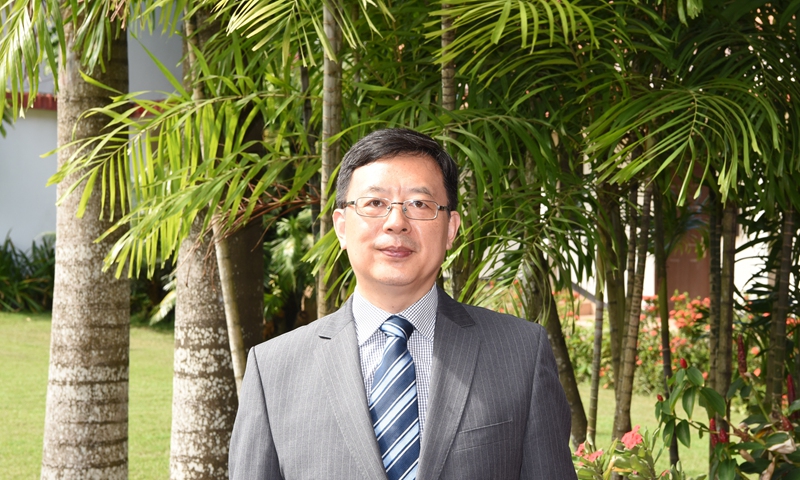
Zeng Fanhua, Chinese Ambassador to Papua New Guinea Photo: embassy
GT: How do you view the current relationship between China and PNG and future prospects?
Zeng: China-PNG relations and pragmatic cooperation have reached a very high level, but there are still huge potential and broad prospects. Both sides hope to further strengthen high-level exchanges and strategic communication, and further enhance political mutual trust. After the pandemic, exchanges at all levels between China and PNG are expected to resume and strengthen as soon as possible.
Of course, the greatest potential is in economic, trade and technological cooperation. The two sides are stepping up the joint feasibility study of free trade, which is conducive to creating better framework conditions for bilateral economic, trade and investment cooperation. PNG welcomes Chinese enterprises to increase investment in downstream processing industries in the fields of energy, minerals, forestry and fishery.
Chinese enterprises have high-quality production capacity, technology and funds, and are fully qualified to carry out mutually beneficial and win-win cooperation. PNG has rich tourism resources and unique culture, and hopes to attract more Chinese tourists, which will be a new growth point with great potential. Of course, we also hope that PNG can create a good, efficient and safe business and tourism environment for Chinese enterprises and Chinese tourists.
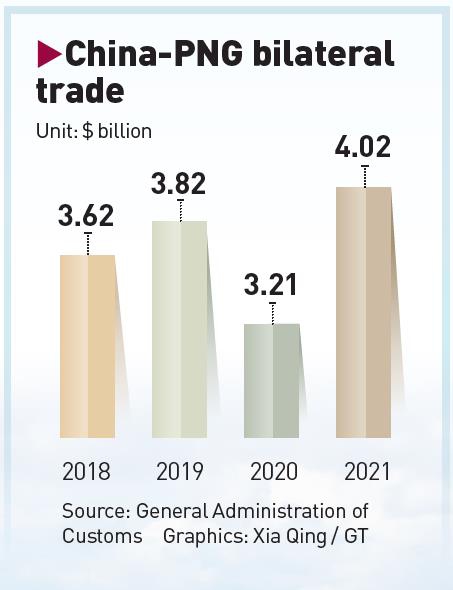
China-PNG bilateral trade 2018-2021 Graphic: GT
GT: What are the major BRI projects in PNG? How do these projects support PNG's economic development and improvement of people's livelihood?
Zeng: At present, the most influential BRI project in PNG is the first demonstration base of Juncao upland rice technology assisted by China. The project has been implemented continuously for more than 20 years, and has played an important role in the development of agricultural and rural areas in PNG. This project has been implemented by the team of Lin Zhanxi of Fujian Agriculture and Forestry University.
Chinese-funded enterprises in PNG have actively supported the joint construction of the BRI and undertaken a large number of important cooperation projects. For example, during PNG's Prime Minister James Marape's visit to China in February this year, the two sides reached an agreement on the cooperation of the PNG Power Grid second phase project. The project was undertaken by a Chinese-funded enterprise, which can build transmission and distribution backbones for PNG's highlands and mountainous provinces. It is conducive to solving the development "bottleneck" of the shortage of electricity supply in PNG.
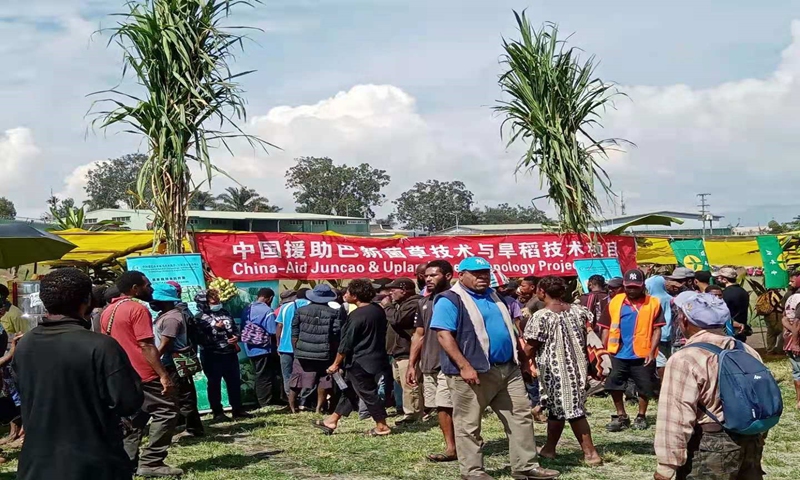
The China-aid Juncao and upland rice technology project in Papua New Guinea Photo: Ministry of Commerce of China
The PNG Enga Provincial Hospital Project, which is also constructed by a Chinese-funded enterprise and is about to be delivered, will become a comprehensive hospital with the best hardware conditions in PNG, which is conducive to providing better medical services for the local people. In addition, Chinese firms have also helped to build a large number of infrastructure projects such as roads, bridges, and airports.
China promises to provide PNG with economic and technical assistance without any political conditions attached, which will help drive the implementation of these cooperation projects as soon as possible, help the local economy develop and improve people's livelihood, and bring tangible benefits and opportunities for further development to the local people, so it is widely welcomed.
GT: How do the two countries' development strategies connect with each other?
Zeng: PNG is the largest country in the Pacific Island region and the first country in the region to sign a MOU on the construction of the China-proposed BRI with China. Over recent years, the two have jointly promoted the high-quality construction of the BRI to achieve mutual benefit, which has not only received strong support from the PNG government, but has also become more and more popular in PNG society.
Since entering the new century, the PNG government has successively put forward strategies such as "Vision 2050", "Strategic Development Plan 2010-2030", and "Connecting Papua New Guinea", in an effort of building PNG into a prosperous, fair, wise, healthy, safe and happy country, which can be said to be a blueprint for realizing the "Papua New Guinea Dream."
In the past two or three years, due to the impact of the pandemic, PNG's economic and social development has encountered some difficulties, but it is still actively promoting the above-mentioned strategic goals and making new progress. In the process of promoting its own development, PNG is willing to learn from China's successful development experience, and at the same time regard China as one of the most important development partners.
China and PNG are good friends, good partners and good brothers, and we are willing to provide assistance within our capacity to support PNG's development. The BRI is highly compatible with the development strategies of PNG. Therefore, the two sides agreed to strengthen strategic alignment, further tap cooperation potential, and continuously expand the breadth and depth of China-PNG pragmatic cooperation to benefit people of the two countries.
GT: What kind of support has China and PNG provided to each other during the COVID-19 pandemic?
Zeng: Adversity reveals true friendship, and the friendship between China and PNG has withstood the test of the COVID-19 pandemic. In the early days of the outbreak in China, PNG, as a developing country, quickly extended a helping hand to China, providing moral support and material assistance to China.
When PNG encountered several waves of new infections, China reciprocated, providing the country with multiple shipments of vaccines, protective materials, and medical equipment assistance, which played an important role in supporting PNG's fight against the epidemic. In this regard, PNG Prime Minister Marape once again expressed his heartfelt thanks to the Chinese side during his visit to China in February this year.
China and PNG have stood together in the same boat and helped each other in the fight against the epidemic, which well exemplifies the concept of a community of human health, in which the destinies of all countries in the world are closely linked.
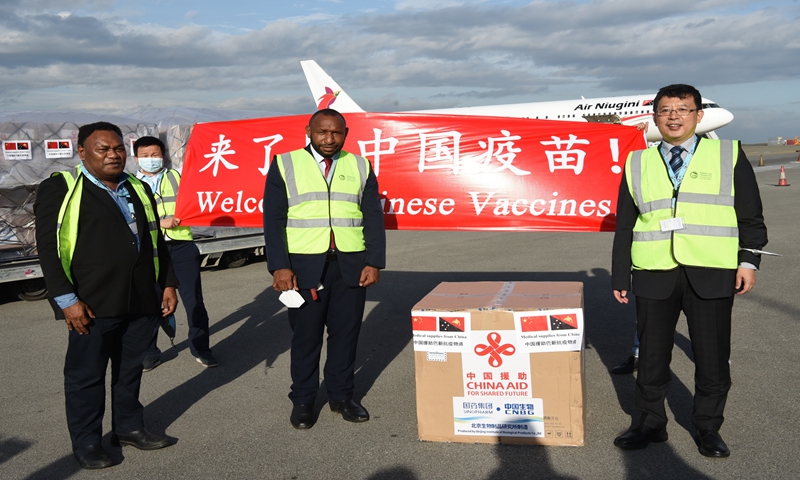
China's donated COVID-19 vaccines arrive in Port Moresby, capital city of PNG, on June 23, 2021. Photo: Chinese embassy in PNG
GT: Some countries such as the US and Australia have been hyping the so-called China threat theory regarding the cooperation between China and South Pacific island countries, how do you comment on that? Will this affect cooperation between China and PNG?
Zeng: Out of selfishness, a few countries have spared no effort to concoct and sell the "China threat theory" in an attempt to disrupt China's cooperation with Pacific island countries, but in fact they are unpopular in PNG and other countries in the region. The governments and people of Pacific island countries such as PNG are looking forward to peace and seeking development, and they are particularly concerned about the huge challenges posed by climate change to small island countries. They are firmly opposed to engaging in "small circles" and provoking confrontation, and they also refuse to take sides.
They are also fully aware that these countries that spread the "China threat theory" have neglected the development of island countries for a long time, but they make irresponsible remarks about China's willingness to help their development. They view China's rapid development as an opportunity, and especially value China's huge market. Therefore, I believe that certain countries' move will not affect the cooperation between China and PNG and other Pacific island countries, but will only allow the Pacific island countries to further recognize their true color and become more committed to mutually beneficial and win-win cooperation with China.

